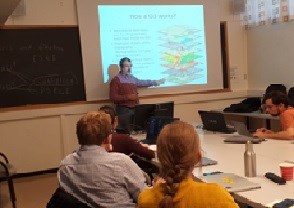Billig
Billig

Promoter: Universidade Nova de Lisboa
Partners:ILOS (University of Oslo)
Digital Humanities Laboratory (NOVA FCSH)
EEA Grants: 12 508,16
Grace Code: PT-BI008
Programme:- BILLIG | BILATERAL LUSOPHONE LITERATURE INITIATIVE USING GIS AND LINGUISTICS
- End of the project and results
- BILLIG: results achieved from this initiative
- BILLIG project: Bilateral Lusophone Literature Initiative using GIS and Linguistics
What did this initiative focus on?
The BILLIG initiative was an opportunity to create synergies between two research teams, in Oslo and Lisbon allowing also knowledge sharing between:
- two methodologies (Natural Language Processing and Geographical Information Systems);
- two projects (Literateca and Atlas of the Literary Landscape) with the aim of advancing the study of literature in Portuguese available in digital format.
In this sense, it was a project that obtained replicable results in the two teams and methodologies, that had an impact on a network of researchers that went far beyond the initial teams and that contributed to the areas of Computational Linguistics, Literature, History and Digital Humanities in general.
The project started in September 2019 ending in December 2020.
Throughout those months were organised:
- an introductory course;
- two workshops;
- a development course and a scientific visit that allowed the two teams to exchange knowledge and experiences about the different methodologies used, developing new competencies, namely in the area of text processing and annotation by the researchers of NOVA FCSH, as well as in the area of cartography and spatial analysis by the researchers of the University of Oslo.
The organisation of these events had an impact beyond the original teams, and it was possible to reach researchers from other universities in Portugal and Norway, as well as from other countries, such as Spain, France or Brazil, with a total of 54 attendances.
In addition to sharing scientific knowledge and improving the methodologies used, the project team made two oral communications in scientific events and has a third communication accepted for an international congress to be held in 2021, published an article in the proceedings of a congress, an article in a scientific journal and submitted a third article at the beginning of January to the journal Digital Humanities Quarterly, awaiting the result of the evaluation.
Content revision work was also carried out on the Literateca and on the Atlas of the Literary Landscape, as well as the creation of a pilot application to generate maps from literary texts, soon to be available on the Literateca website.